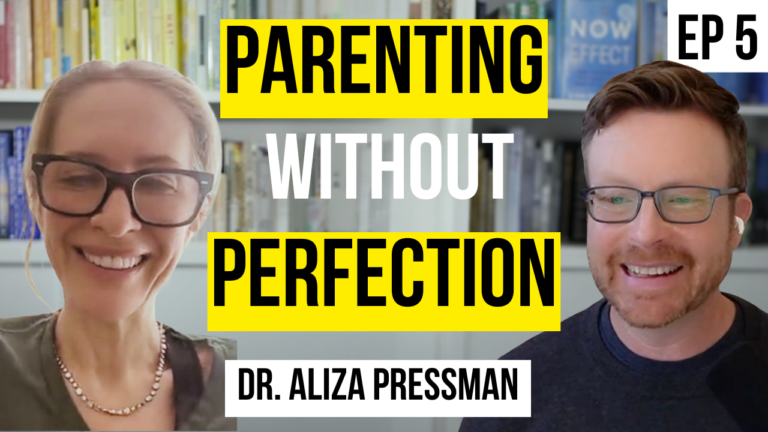
Personal Growth

Founder and Psychologist
by Dr. Elisha Goldstein
“Our job as parents is not to be perfect, but to be present, repair when we fail, and model how to grow from imperfection.” – Dr. Aliza Pressman
We discuss:
SHOWNOTES
Parenting is one of life’s greatest challenges, yet it also offers some of the most profound opportunities for growth. In today’s episode of the Emotional Longevity Podcast, I had the pleasure of speaking with Dr. Aliza Pressman, a parenting expert and author of The Five Principles of Parenting. Dr. Pressman offers a refreshing perspective on parenting that focuses on connection, growth, and the power of repair rather than perfection.
The Importance of Connection and Reflection in Parenting
“When parents reflect on their values and what really matters to them, it alleviates the stress of the everyday parenting noise.” – Dr. Aliza Pressman
One of the core themes Dr. Pressman discusses is the importance of reflection in parenting. This reflective practice allows parents to stay grounded and focus on what truly matters: building meaningful, connected relationships with their children.
Aliza’s book distills developmental science into five key principles that aim to help parents navigate the complexities of raising children in today’s world. It’s not about following rigid rules or striving for unattainable perfection, but about being present and intentional with the relationships we’re building with our kids.
Parenting Imperfection: The Power of Repair
Dr. Pressman brings us back to an essential truth about parenting: it’s not about being perfect, but about being present and repairing when things go wrong. “We are not raising perfect children. We are raising children who will know how to navigate their mistakes and the mistakes of others,” she says. This message is vital for parents who often feel overwhelmed by the pressure to do everything right.
She shares a personal story about a time when she had a major parenting failure, yelling at her daughter in a way that felt like a huge rupture. But Aliza found comfort in the power of repair. “When we repaired, it was like nothing happened,” she reflects. “The relationship grew stronger because we both knew how to come back together.”
This idea of repair is supported by years of research in child development, proving that children are far more resilient than we give them credit for, especially when they have loving, consistent caregivers who are willing to repair after ruptures in the relationship. This is a reminder for all parents that imperfection is part of the journey – and that we can always come back to our kids with love and understanding.
The Passcode to Emotional Regulation
Dr. Pressman also offers an incredibly practical tool for emotional self-regulation, which she calls a “passcode.” She explains that everyone has physical cues when they’re about to lose their emotional balance – whether it’s clenching their jaw, tightening their fists, or feeling their heart race. “Recognizing these signs early and using your passcode—whether it’s breathing, grounding yourself, or listening to a calming song—can help you reset,” she shares.
This passcode, as Aliza describes it, is a tool for parents to return to emotional regulation and model emotional resilience for their children. By taking a moment to self-soothe and reflect, parents can show their kids how to stay present and calm during challenging moments.
“Parenting isn’t about getting it right every time, it’s about showing up and trying again” – Dr. Aliza Pressman
Parenting with Values and Boundaries
Lastly, we discuss the importance of boundaries in parenting. Many parents struggle with the balance between connection and setting rules. Aliza emphasizes that boundaries are essential for teaching children about respect and the reality of the world around them. “It’s not about controlling your kids; it’s about preparing them to live in a world with other people who have their own values and needs,” she explains.
When parents are clear about their boundaries and values, they’re not only helping their children learn how to function in society but also reinforcing the strength of the parent-child relationship.
“When you are clear about your values, you can set boundaries with confidence, knowing that they’re not just about control, but about keeping your child safe, healthy, and ready to thrive in the world.” – Dr. Aliza Pressman
Embracing Imperfection and Connection
As Dr. Pressman beautifully puts it, “Parenting is not about perfection, but connection. We are the parents our children need, imperfections and all.” Her message is a powerful reminder that it’s not about getting everything right – it’s about fostering love, trust, and resilience through every messy, imperfect moment.
If you ever feel overwhelmed as a parent, take a deep breath and remember: reflection, repair, and emotional regulation are far more important than striving for perfection. Every moment is an opportunity to connect, to learn, and to grow alongside your child.
For more invaluable insights on parenting, emotional health, and building strong relationships, check out Dr. Pressman’s book The Five Principles of Parenting and her podcast Raising Good Humans.
If this conversation resonated with you, I encourage you to share it with a fellow parent who could use this reminder. They can listen to this episode of the Emotional Longevity podcast or read this blog.
And if you’re ready to take your emotional well-being to the next level, I invite you to join my Emotional Health Coaching Program, Uncover the Power Within. Just as we’ve explored the power of emotional awareness and connection in parenting, this program offers science-backed tools and a supportive community to help you build resilience, heal from burnout, and cultivate lasting emotional strength – so you can thrive in every aspect of life.
Subscribe here to be the first to hear when the next episode of the Emotional Longevity Podcast releases. Until then, take care of yourself – because when you nurture your emotional health, you nurture the relationships that matter most.